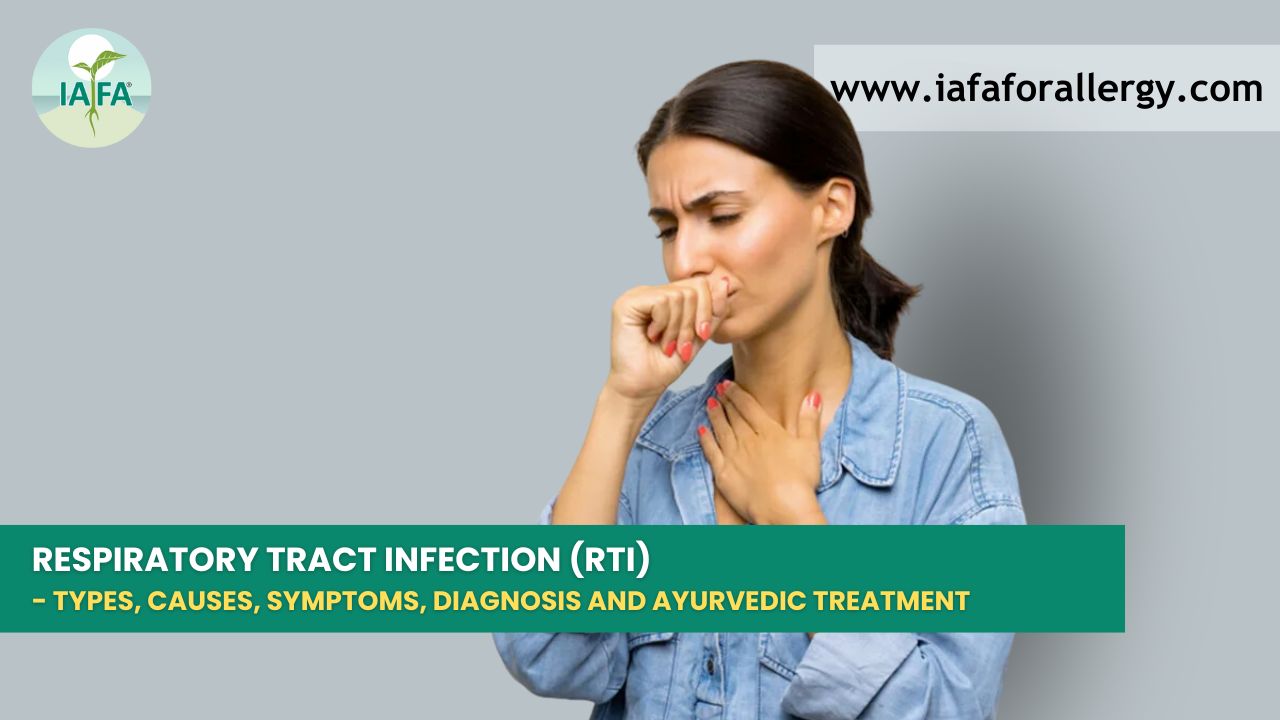According to Ayurveda, respiratory tract illnesses are identified as a significant health concern. The ancient wisdom of Ayurveda provides holistic treatment to address these concerns, which holds even more importance in the post-COVID era as the body’s vital forces or doshas are restored and empower respiratory health through herbal combinations and lifestyle modifications.
In Ayurveda, respiratory tract infections are considered as Shwas Vyadhi. Swas Vyadhi is a disease in which the prana vayu is directed upward and produces a sound like bhastrika. The origin of pranavaha srotas is hridya and mahastrotas. Prana vayu performs the vital activity of breathing in and out, which is essential for living. In this article, we will cover all the aspects of the disease including ayurvedic treatment of respiratory tract infections.
Causes of Respiratory Tract Infection (RTI)
According to Ayurveda, the following reasons culminate in developing respiratory tract illnesses:-
- Increased smoking
- Atmospheric pollution
- Occupational disorders
- Dietary factors
How Respiratory Tract Infection (RTI) Occurs – As Per Ayurveda?
The vitiated Kapha dosha produces strotoavrodh in pranavaha strotas, and as a result, the natural flow of vayu gets blocked, and vata dosha acquires pratiloma gati so that vata dosha dryness is aggravated. The natural lubrication properties get disturbed, which results in difficulty in breathing and the rate of breathing increases and produces swas rog.
Also Read:- How to Treat Fungal Infections in Lungs Naturally?
Types of Respiratory Tract Infections
Respiratory tract infections can be classified into 2 broad categories:
- Upper Respiratory Tract Infections
- Lower Respiratory Tract Infections
Upper Respiratory Tract Infections:- These are Common cold, Sinusitis (sinus infection), Tonsillitis, Laryngitis, and common viral infections that impact the nose, throat, and upper respiratory airways and prompt symptoms like congestion, sore throat, and cough.
Lower Respiratory Tract Infections:- Lower respiratory infections impact the lungs and cause diseases such as bronchitis, bronchiolitis, and pneumonia which produce symptoms like cough, congestion in the chest, and shortness of breath.
Types of Respiratory Tract Infections – As Per Ayurveda
In Ayurveda, Respiratory Tract Infections is called “Swas Vyadhi” and it is classified into the following types:-
- Maha Swas
- Urdhwa Swas
- China Swas
- Kshudra Swas
- Tamak Swas
Symptoms of Respiratory Tract Infections (RTI)
The following are the symptoms of respiratory tract infections:-
- A productive cough with mucus
- Sneezing
- Blocked or runny nose
- Sore throat
- Pain in Head
- Muscular pains
- Difficulty in breathing, tightness in chest and wheezing
- Rise of temperature
- Feeling unwell
Symptoms of Respiratory Tract Infections – As Per Ayurveda
Symptoms of respiratory tract infection depend on their type, which are mentioned below:-
1. Maha Swas:- Due to the upward movement of vitiated vayu, the patient takes deep breaths along with loud noises like that of a bull as the respiratory pathways are obstructed. The patient loses his physical and mental well-being, his eyes protrude out, and his eyes and face become distorted. The patient also becomes anemic and constipated. His voice becomes feeble. The patient becomes mentally fragile, the sound of his deep inspiration becomes audible from a distance, and he will likely succumb to death.
2. Urdhawa Swas:- In this type of swas rog, the patient has a prolonged expiration and problems in taking the air in. The mouth and the breathing pathways become coated with phlegm or mucus. The patient’s eyeballs move upwards, have bewildered eyes, loss of consciousness, excessive pain, dry mouth, and irritability.
3. Chinna Swas:- This type of swas rog is characterized by interruption or stoppage of breath as all the respiratory pathways are afflicted. The patient is in great distress and has severe pain as if some vital organ or marma is injured. The patient suffers from constipation, flatulence, sweating, and loss of consciousness. There is burning in the urinary bladder and tears in the eyes. The patient struggles to get breath, discoloration of skin, delirium, and looseness of joints.
4. Kshudra Swas:- Vayu gets vitiated in the gastrointestinal tract, and the exertion causes kshudra swas, producing mild symptoms. It is less painful than other types of swas and does not cause any significant complication in sense organs. This type of swap can be easily cured.
5. Tamak Swas:- The movement of vayu gets deranged, permeating the breathing channels and, hence, afflicts the head and neck region and stimulates the mucus to cause rhinitis. The patient receives acute spasms of cough, and the patient becomes unconscious while coughing, as the phlegm does not come out quickly. The patient feels relieved when the mucus is cleared, and he/she encounters difficulty breathing while lying down. The patient develops a liking for hot things, and the eyes protrude out. The mouth becomes dry, and the patient becomes restless.
Diagnosis of Respiratory Tract Infection (RTI)
The common tests that are advised in case of respiratory tract infections are:-
- CBC (Complete Blood Count)
- CRP (C-reactive protein)
- Sputum Test
- Chest XRay
Diagnosis of Respiratory Tract Infection – As Per Ayurveda
According to Ayurveda, respiratory tract infections can be detected by taking a detailed history which can point towards the dominance of dosha. For instance, yellowish-colored mucus suggests pitta predominance. The next step is to perform nadi pariksha and the pulse examination also helps to understand the doshas balance and then the treatment is directed accordingly.
Treatment of Respiratory Tract Infection
The first line of action in Ayurveda is “Nidana Parivarjanam,” which means the removal of causative factors and breaking the disorder’s pathogenesis. IAFA is glad to bring you carefully curated herbal formulations for Ayurvedic treatment of respiratory tract infection (RTI).
Medications
A proprietary Ayurvedic herbal formula meticulously curated to uplift your respiratory system’s well-being. The formula is a unique combination of 7 herbs: Ocimum tenuiflorum, coleus aromatic, glycyrrhiza glabra, Abies webinar, and Hyssopus officials. This tea strengthens your respiratory system and rediscovers the joy of effortless breathing!
Nasayoga Grutham is the nasal drops from the Himalayas that are infused with Cow A2 Grutham and respiratory wellness herbs. Empower your respiratory system with our 100% natural solution, carefully formulated using a blend of highly effective herbs to support trouble-free breathing. Say Goodbye to seasonal allergies and welcome to a new free from ears, nose, and throat troubles and with a healthy respiratory system. IAFA’s Nasayoga Grutham is a key ingredient to limit your breathing troubles by addressing nasal and sinus blockage, elevating your stress-free breathing experience, and promoting overall health and wellness. The product is easy to use as you can add 4-5 drops two times daily for adults in each nostril and for children up to 10 years of age, use 1-3 drops once daily.
3. IAFA Respiratory Detox Tablet
IAFA Respiratory Detox Tablet is your ultimate solution for respiratory health as this tablet is a gateway to Ayurvedic wisdom on establishing doshas balance to empower your breathing mechanism.
Unleash the power of IAFA Total Care 3X Ras, a 100% herbal preparation formulated to manage respiratory illnesses, skin diseases, and allergies. With 7 most effective and powerful herbs, this natural remedy helps to manage shallow breathing, bronchitis, chronic nasal allergies, recent cough and cold, and skin allergic conditions. Uplift your overall well-being and boost your immune system Choose wellness, choose IAFA Total Care 3X Ras.
Diet and Lifestyle
Ayurveda provides holistic management to enhance respiratory health by following diet and lifestyle modifications to elevate overall health and fitness. The following are the diet and lifestyle advice as per Ayurveda:-
- Eat a balanced diet having all the tastes like sweet, sour, salty, bitter, pungent, and astringent as they help to maintain the doshas balance.
- Use ayurvedic herbs like tulsi and also add certain spices such as black pepper, long pepper, haridra, fennel, and others as they are potent anti-inflammatory and antioxidant.
- If you are suffering from respiratory tract infections then reduce the intake of dairy items as they increase mucus production.
- Try to eat light, warm, easy-to-digest, and freshly cooked meals like khichdi, vegetables, or lentil soup.
- Nasya or the application of warm medicated oils in the nostrils helps to maintain lubrication and also removes obstruction.
- Steam inhalation should be practiced to loosen the mucus.
- Follow gentle yoga and pranayam to enhance lung capacity, increase circulation, and promote overall well-being.
Yoga and Pranayama
Do you know that Yoga and Pranayama can be your best friends if you are suffering from respiratory tract infections? Yoga asanas and breathing practices can enhance breathing function and reduce inflammation. Regular practice of yoga also helps to reduce the overload of allergens and harmful pathogens and therefore helps to manage respiratory tract infections.
Some of the Yoga asanas and Pranayama that are beneficial in respiratory tract infections are:
- Bhujanagaasana (Cobra pose)
- Dhanurasana ( Bow pose)
- Matsyaasana (Fish Pose)
- Anuloma Viloma (Alternate nostril breathing)
- Bhastrika Pranayama
Also Read:- Top 5 Breathing Exercises that Help in the Sinusitis Treatment
Things You Can Do
You can do the below-listed things to manage respiratory tract infections effectively:-
- Take rest
- Drink warm water to loosen mucus and help in the expulsion.
- Raise your head with the pillows to support breathing.
- Apply warm oils on the chest and back like Garlic infused mustard oil.
- Applying warm fomentation by ironing a soft cloth and placing it on the chest also helps the mucus to loosen up and can be expelled quickly.
Conclusion
Respiratory tract infections can be effectively managed using ayurvedic approaches that include internal medications, and diet and lifestyle modifications. Ayurveda emphasizes restoring the doshas balance to achieve well-being. Ayurvedic treatment of respiratory tract infections is simple yet powerful and also prevents the recurrence of the disease.
If you are stressed as you or your loved one is suffering from respiratory tract infection or allergy, then please book your appointment now and get consulted with IAFA Ayurveda’s diligent team of doctors headed by Dr Sahil Gupta. IAFA is one of the most trustworthy and committed institutions to making the world a better place through its original and holistic approach. Dr. Gupta’s team provides effective treatment for all types of allergies and respiratory infections using 100% natural and herbal products.








